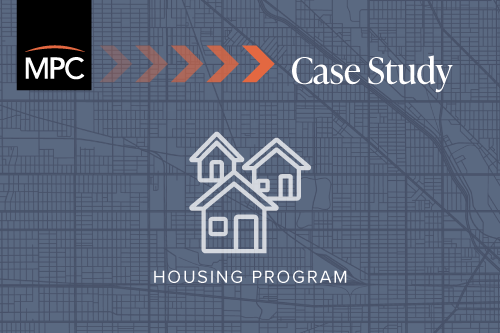Rental Licensing Program
Hanover Park
Housing Program

Program background
The Code Enforcement Unit in Hanover Park plays a significant role in promoting public health and safety through its oversight of property maintenance standards. In 1999, the local police department assumed responsibility for the Village’s code enforcement work, limiting their inspections to multifamily buildings. After the Village began seeing an increase in single-family rental properties, they added a single-family rental licensing inspection program in 2009. There is one officer dedicated to single-family rental properties and three officers dedicated to multifamily rental properties. Officers are assigned designated areas to survey properties for any maintenance violations. The Village’s goal of enforcement is to achieve full voluntary compliance amongst all property owners.
How it works
Owners of single-family properties pay $100 to apply for a rental license that includes the first and second inspection (if needed). Owners of a multifamily building pay a license fee of $75 per rental dwelling unit, which also includes two inspections (the second only if needed). If any property owner does not pass the first inspection, a second inspection is scheduled at no cost. They are assessed a $75 fee if they do not pass the second inspection, and will be charged an additional $75 for a third inspection. Twenty-five dollars will be charged with 6 percent interest for failure to pay any inspection fee within thirty days of an inspection. The responsible party is charged a $50 no-show fee if they are not present at the time of inspection. Property owners are not awarded a rental license until they pass inspection. If property owners need more time to reach full compliance, they can enter into an agreement with the Village to extend the amount of time they have to fix any violations. If compliance is not reached, they can be brought to court for not possessing a valid rental license.
There is an established timetable for multifamily application submissions and inspections. First inspections are scheduled from November to February. It is the responsibility of the landlord or the property manager to be present at the time of inspection, and to notify tenants in advance of an inspection. Code enforcement officials inspect all interior units and common areas as well as the exterior of the property. The license fee needs to be paid before the beginning of the license year, and all inspections need to take place within the license year. Single-family license applications can come in at any point during the year. Whereas multifamily properties are inspected every year, single-family properties are inspected every two years.
Toward the beginning of 2013, Hanover Park instituted a Crime Free Multi-Housing Program as part of a broader effort to promote safer, more livable communities. Prior to obtaining a rental license, all rental property owners must attend an 8-hour training seminar. The Village offers training sessions four times a month, and landlords must attend once every four years. In addition, the Village requires landlords to adopt a crime-free lease addendum, which offers protections to both landlords and tenants. With about 2,500 rental units in Hanover Park, half multifamily and half single-family, the village has made it a goal to have half of these certified as crime-free properties within the next year.
Contact
Department of Code Enforcement, Village of Hanover Park
630-823-5860, www.hanoverparkillinois.org
-
Goal
Enforce responsible maintenance of all residential properties and support safe and healthy neighborhoods.
-
Target
Single and multifamily rental properties
-
Financing
Licensing fees, inspection fees and other penalties related to noncompliance
-
Successes
Village response to the program has been positive. Its successful track record with inspections in multifamily buildings allowed for a smooth adoption of a single-family rental licensing program.
-
Lessons learned
Property owners sometimes request for inspections to be rescheduled to allow for more time to fix violations. Village flexibility around inspections leads to improved relationships with property owners and better program outcomes.